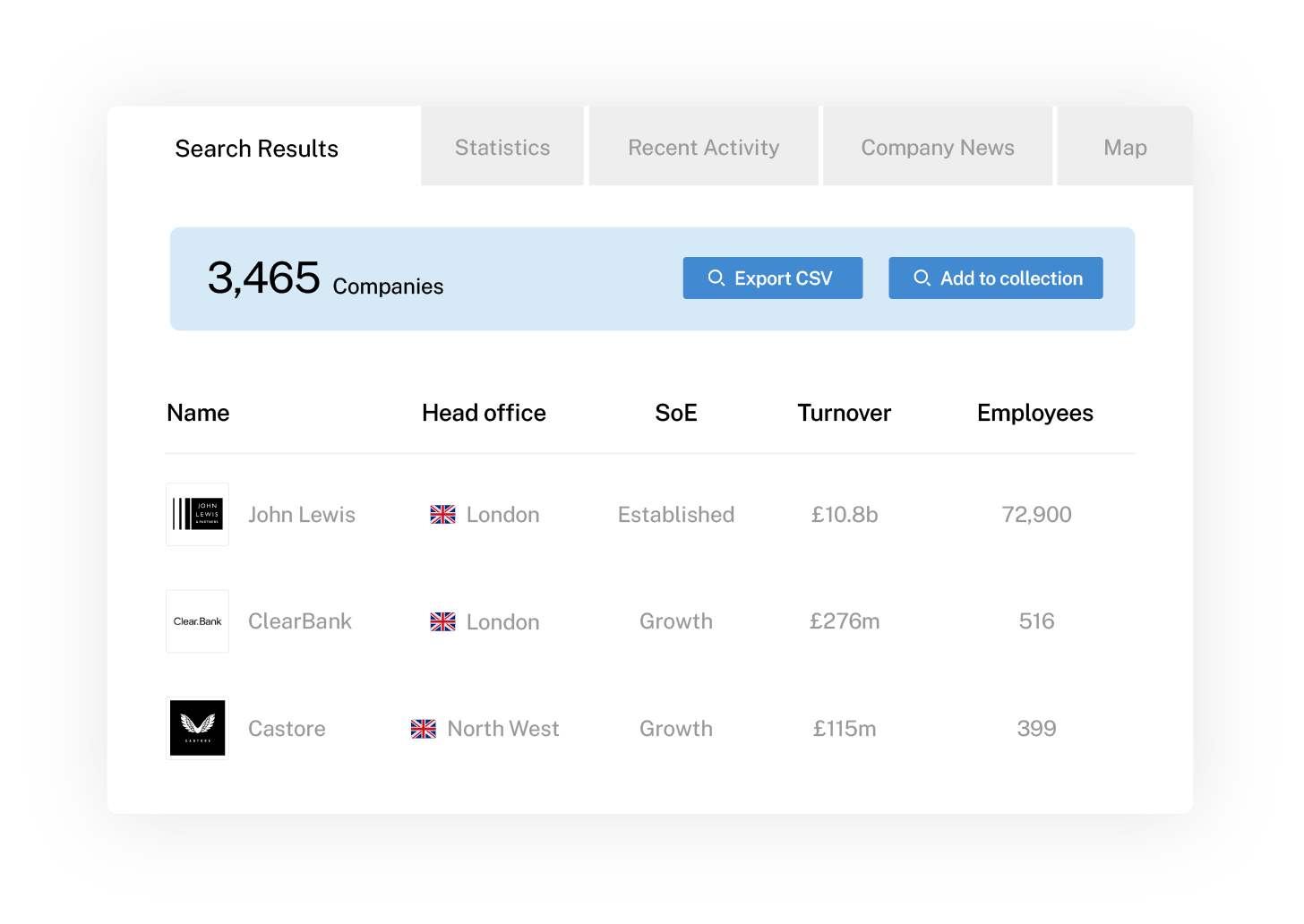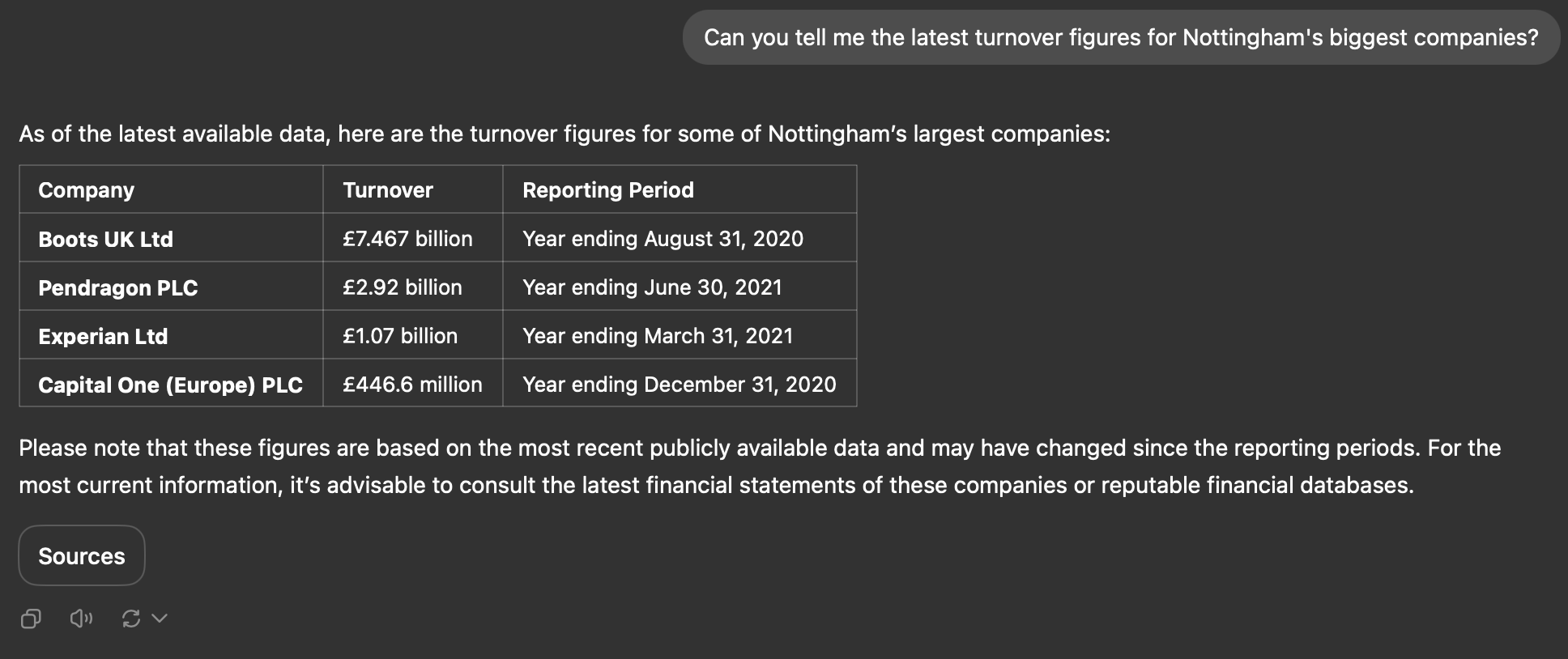
Is ChatGPT Viable for Competitor Research?
At Beauhurst, we’ve been using a combination of machine learning and the expertise of our data curation team to help produce the datasets you know and love on the Beauhurst platform. And with the emergence of generative artificial intelligence (AI) and large language models (LLMs), there are brand-new commercial applications for the technology being discovered every week.
One question we’re hearing semi-frequently is whether ChatGPT could replace a dedicated company data platform – especially when it comes to competitor and market research.
At first glance, ChatGPT could be an excellent asset for tasks like this. AI chatbots are fast, cost-effective, and easily accessible, making them appealing for market research.
But how reliable are they? And do they provide the accuracy, depth, and structure necessary for serious business decisions? In this article, we explore the risks and limitations of relying solely on ChatGPT for competitor research.
How to find niche companies on Beauhurst
Discover how our clients use the powerful Advanced Search tool on the Beauhurst platform to find high-growth companies in niche sectors.
Where AI can be an asset for commercial research
Whether you’re a user of ChatGPT, Gemini, Copilot, or Claude — large language model-based AI tools have a relatively low cost of entry.
And for fast-growing startups, they’re a great way to perform basic research at scale. They provide quick responses and pull insights from across the web, making them useful for top-level research.
However, LLMs are still in their relative infancy and therefore can be prone to hallucinations (aka making things up!). They also don’t often show their sources of information in their responses, making it hard to verify whether their answers are 100% factual.
We would advise against using an AI tool as your primary competitor research tool — especially in the context of making important business decisions.
The risks of relying solely on AI
AI technologies are prompt-dependent
When using any LLM, the output you receive is largely dependent on your input — in other words, your prompting skills. For example, if you ask ChatGPT for a list of companies in a specific industry, the response will vary based on how the question is framed.
A broad query like ‘List the top fintech startups’ might return well-known names, but will almost always overlook niche, or emerging companies. You could refine the prompt to ‘List fintech startups in the UK founded after 2020 with at least £5m in funding’, which may produce better results.
However, LLMs like ChatGPT rely on publicly available text-based information, typically from web pages rather than embedded files. This means structured financial filings, such as Companies House documents, are not included unless manually uploaded or extracted through other tools.
Unreliable and inconsistent data
Another risk of exclusively using ChatGPT for competitor research is the reliability of data. Even now, ChatGPT is prone to hallucinate and create convincing-sounding — but nonetheless factually inaccurate — claims about topics and companies. We’ll explore an example of this later in the article.
Consistency is also a challenge. Asking the same question, but worded in a subtly different way, can shift the emphasis of your request and therefore yield very different answers. This variability can undermine reliability and confidence in the data.
Lack of a research-oriented interface
Unlike dedicated market intelligence platforms, AI tools lack structured search functionality, filtering options, and data visualisation tools—all critical for serious competitor research.
Whichever AI tool you use, they are not designed as structured research databases. Instead, they function as text-based input/output systems, meaning users cannot easily filter by funding rounds, industry trends, or company performance metrics.
While you can export AI-generated data to a spreadsheet, the inconsistent sourcing and lack of structured outputs make it difficult to conduct reliable analysis or compare results over time. In contrast, platforms like Beauhurst provide verifiable, structured company intelligence with real-time updates, ensuring accuracy and consistency.

See the data in action
Want to see the data in action? You’re in luck. Take a virtual tour of the platform and discover how we get our unbeatable data insights.
Let’s look at a specific example. Here, we asked ChatGPT 4o to list the latest turnover figures for Nottingham’s biggest companies. The response is concise enough, listing the results in a neat table, and it reads in a convincing manner — until we investigate the finer details.
The first thing to note is that the sources — limited to local media news releases rather than financial statements — contain information that is over four years old. With companies submitting their financial statements annually, there is a clear oversight here.

To verify the information presented, we looked at the full Boots UK company profile on Beauhurst — and there were a series of conflicting figures.
We can now see that Boots UK’s latest financials were actually filed in August 2023, with a turnover of £7.05b. The platform also revealed that Boots’ 2020 figures were £5.90b, not the £7.47b figure cited by ChatGPT.
Once you compare LLM responses with the fully structured data found on a dedicated company data platform like Beauhurst, the gap in depth, quality, and trustworthiness is evident. In this instance, ChatGPT provided not just out-of-date information, but also incorrect figures.
And if your business strategy relies on high-quality information, with a low margin of error, relying solely on a LLM is not recommended.

What does a company data platform offer that ChatGPT doesn't?
Unlike AI tools that rely on publicly available text, a dedicated company data platform like Beauhurst delivers structured, verifiable, and real-time insights—giving you confidence in the data you use for business decisions.
With Beauhurst, you get:
- Verified financial data with sources: Access turnover, valuations, funding rounds, investor details, and more, sourced directly from filings, investment records, and direct from industry contacts.
- Company structure insights: Explore corporate structures, shareholder tables, leadership teams, and senior stakeholder data in one place.
- Real-time market trends: Track competitor growth, hiring patterns, mergers, acquisitions, and emerging industry shifts.
- Industry benchmarking: Compare competitors on key performance metrics, helping you understand your position in the market.
- Regulatory filings & patents: Gain insight into IP ownership, patents, and compliance details critical for risk assessments.
- Shareable insights: Generate PDF reports and shareable links so your team stays aligned with accurate, up-to-date information.
- Powerful and flexible search: Use our Advanced Search tool to find exactly the right companies, funds, people, and transactions you’re interested in, by searching over any combination of datapoints.
Our recommendation
With all this in mind, should you cancel your ChatGPT subscription and just use Beauhurst? Not necessarily. The best approach is to use both tools strategically.
ChatGPT is extremely helpful for qualitative analysis, for example examining your competitors’ strategy and brainstorming ideas to help your business against competitors. You can also generate SWOT analyses (strengths, weaknesses, opportunities, threats) for direct, evidence-based points of comparison.
It’s excellent at summarising competitors’ reports, press releases, and articles, pulling out the key insights and common trends across multiple sources. If you already have a spreadsheet of data from a reliable source (such as Beauhurst), ChatGPT can analyse that data in seconds, saving time and energy.
However, while AI tools are useful for high-level insights, they cannot track real-time competitor movements, verify financial data, or deliver any kind of meaningful structured or evidence-based trends.
For serious business decisions with financial implications, you need more than basic qualitative analysis from a LLM. That’s where Beauhurst comes in—offering accurate, real-time market intelligence and structured, verifiable data, that ChatGPT simply cannot provide.
Used together, AI and Beauhurst form a powerful competitor research toolkit — combining the speed of analysis from AI, data-driven insights from Beauhurst, and, of course, your own industry experience.
Want to see the platform in action? Why not take a quick online tour of the platform? Or, talk to us directly using the form below.
Discover our data.
Get access to unrivalled data on the companies you need to know about, so you can approach the right leads, at the right time.
Schedule a conversation today to see all of the key features of the Beauhurst platform, as well as the depth and breadth of data available.
We’ll work with you to build a sophisticated search, returning a dynamic list of organisations that match your ideal customer profile.
Beauhurst Privacy Policy